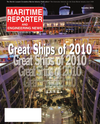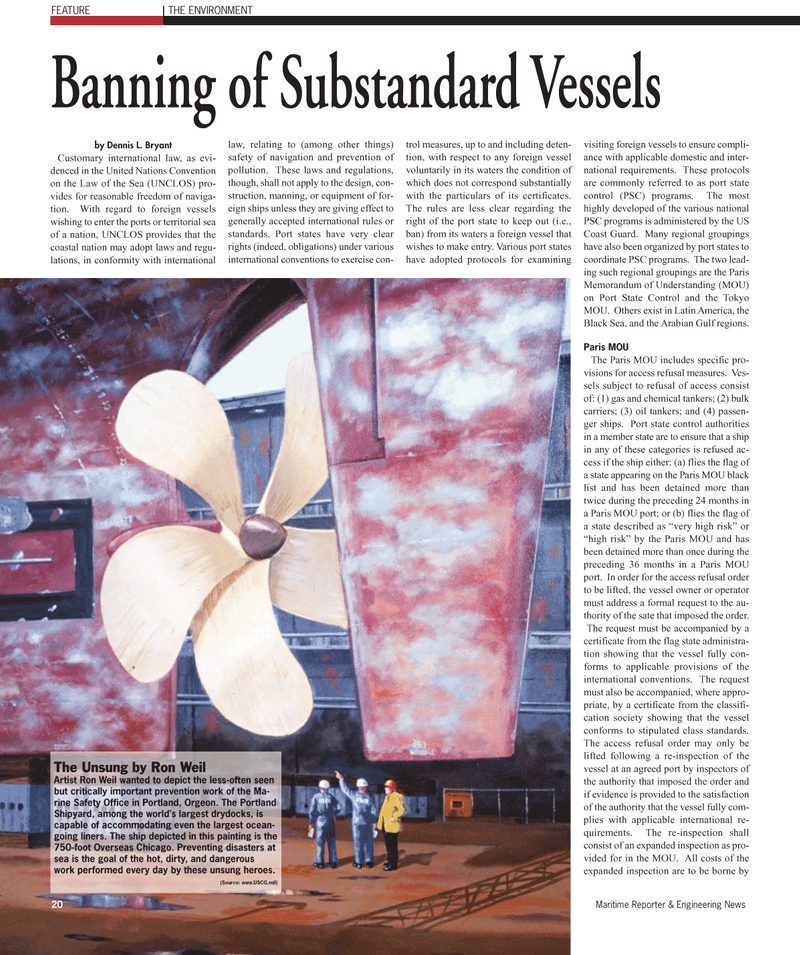
Page 20: of Maritime Reporter Magazine (December 2010)
Great Ships of 2010
Read this page in Pdf, Flash or Html5 edition of December 2010 Maritime Reporter Magazine
by Dennis L. Bryant
Customary international law, as evi- denced in the United Nations Convention on the Law of the Sea (UNCLOS) pro- vides for reasonable freedom of naviga- tion. With regard to foreign vessels wishing to enter the ports or territorial sea of a nation, UNCLOS provides that the coastal nation may adopt laws and regu- lations, in conformity with international law, relating to (among other things) safety of navigation and prevention of pollution. These laws and regulations, though, shall not apply to the design, con- struction, manning, or equipment of for- eign ships unless they are giving effect to generally accepted international rules or standards. Port states have very clear rights (indeed, obligations) under various international conventions to exercise con- trol measures, up to and including deten- tion, with respect to any foreign vessel voluntarily in its waters the condition of which does not correspond substantially with the particulars of its certificates.
The rules are less clear regarding the right of the port state to keep out (i.e., ban) from its waters a foreign vessel that wishes to make entry. Various port states have adopted protocols for examining visiting foreign vessels to ensure compli- ance with applicable domestic and inter- national requirements. These protocols are commonly referred to as port state control (PSC) programs. The most highly developed of the various national
PSC programs is administered by the US
Coast Guard. Many regional groupings have also been organized by port states to coordinate PSC programs. The two lead- ing such regional groupings are the Paris
Memorandum of Understanding (MOU) on Port State Control and the Tokyo
MOU. Others exist in Latin America, the
Black Sea, and the Arabian Gulf regions.
Paris MOU
The Paris MOU includes specific pro- visions for access refusal measures. Ves- sels subject to refusal of access consist of: (1) gas and chemical tankers; (2) bulk carriers; (3) oil tankers; and (4) passen- ger ships. Port state control authorities in a member state are to ensure that a ship in any of these categories is refused ac- cess if the ship either: (a) flies the flag of a state appearing on the Paris MOU black list and has been detained more than twice during the preceding 24 months in a Paris MOU port; or (b) flies the flag of a state described as “very high risk” or “high risk” by the Paris MOU and has been detained more than once during the preceding 36 months in a Paris MOU port. In order for the access refusal order to be lifted, the vessel owner or operator must address a formal request to the au- thority of the sate that imposed the order.
The request must be accompanied by a certificate from the flag state administra- tion showing that the vessel fully con- forms to applicable provisions of the international conventions. The request must also be accompanied, where appro- priate, by a certificate from the classifi- cation society showing that the vessel conforms to stipulated class standards.
The access refusal order may only be lifted following a re-inspection of the vessel at an agreed port by inspectors of the authority that imposed the order and if evidence is provided to the satisfaction of the authority that the vessel fully com- plies with applicable international re- quirements. The re-inspection shall consist of an expanded inspection as pro- vided for in the MOU. All costs of the expanded inspection are to be borne by
THE ENVIRONMENTFEATURE 20 Maritime Reporter & Engineering News
Banning of Substandard Vessels
The Unsung by Ron Weil
Artist Ron Weil wanted to depict the less-often seen but critically important prevention work of the Ma- rine Safety Office in Portland, Orgeon. The Portland
Shipyard, among the world's largest drydocks, is capable of accommodating even the largest ocean- going liners. The ship depicted in this painting is the 750-foot Overseas Chicago. Preventing disasters at sea is the goal of the hot, dirty, and dangerous work performed every day by these unsung heroes. (Source: www.USCG.mil)

 19
19

 21
21
